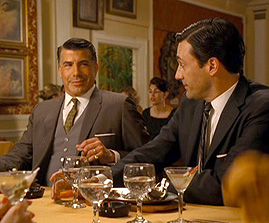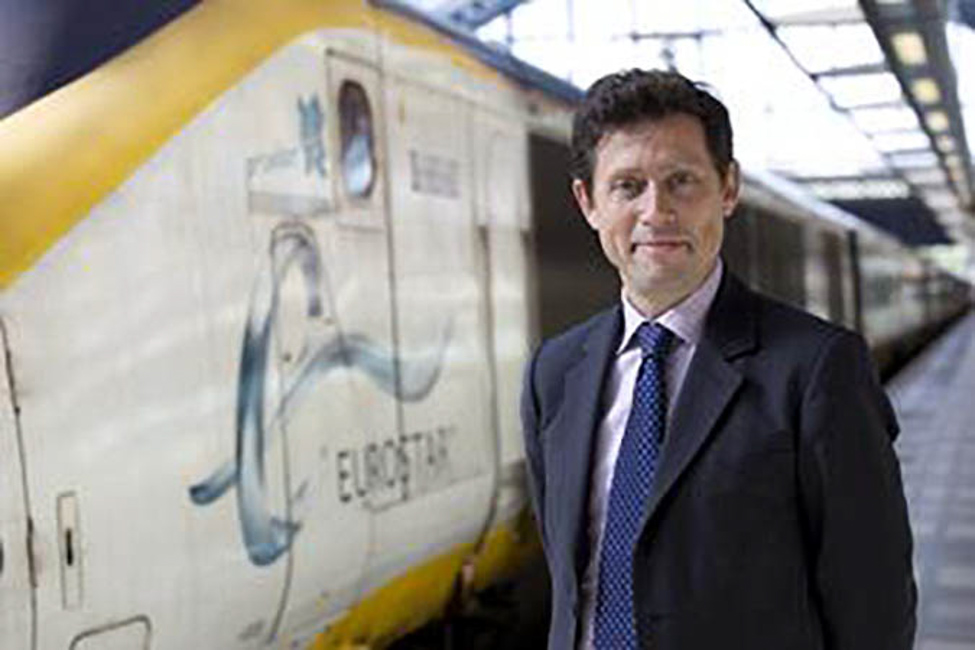More than any other business figures, Nicolas Petrovic (43) embodies the new 400,000-strong “Eurostar generation” of French people who have made London their home. After studying in Paris at leading business schools ESCP and Insead, he started his career at the national rail company SNCF, after a two years stint in China. He moved to Eurostar’s London headquarters in 2003 and has been CEO of the newly privatised and unified company since 2010. Nicolas Petrovic, who lives in Hampstead with his family and always travels by scooter in London, shares with Chic-Londres his vision for Eurostar and his experience as both CEO and French Londoner.
Do you feel more like a Londoner or a Parisian? After ten years spent living here, I’ve definitely become more of a Londoner, even though a part of me remains Parisian- if only because I travel to Paris at least once per week through work. But I must admit that I find Paris more difficult now, by contrast with London’s relaxed lifestyle. I find everything about London appealing, especially its people’s well mannered and optimistic attitude, its energy and the fact it’s such a multicultural city.
What do you like most about your job? I really enjoy the moments when I actually travel by Eurostar… It allows me to talk at length with the staff and clients and to see first hand whether our policies work or not. I like observing people before they board the train, from busy businessmen to excited kids about to travel to Disneyland: this is such an interesting mix.
Which part of your work is most challenging? I always have to explain every decision I make not only to the shareholders, but also to the clients, the politicians and the journalists. I then have to make sure they’re all on board. Such a job requires to have very clear long term goals and to have the means to turn them into reality.
What is your vision for the future of the Eurostar? I want to make it the number 1 travel choice in Europe- which means to increase the number of destinations, starting this year with new direct or semi-direct trains travelling to Switzerland, Lyon and Aix. We are making huge investments so Eurostar can celebrate its 20th anniversary in 2015 by starting afresh. The old trains are being dismantled and completely rebuilt while we’re also getting a brand new float of Siemens trains later this year.
What will the “new” Eurostar look like? The new trains will look totally different, with new colours and an interior design which breaks the usual rules. Created by Pininfarina, an Italian company that works with Jaguar, Rolls Royce and Ferrari, this new design will be much more innovative, with priority given to functionality and comfort, and new services introduced, such as wifi and infotainment.
What’s a typical week for you? There is no such thing as a typical week in this job, which makes it so appealing. However, I do spend a lot of time explaining the company’s objectives to clients, contractors, politicians and journalists. I go at least once per week to Paris, and sometime also travel to Brussels and Lille, and I regularly meet with the staff, from commercial to technical. Detail is key whrn you work in the service sector, hence the need to have a very detailed knowledge of the company as a whole.
What are you most proud of professionally? People thoughtthat the Olympics would turn into a disaster, but instead everything ran smoothly, with magical moments such as the arrival in London by Eurostar of the Paralympic athletes. I’m also very proud of the way we managed to move from Waterloo to Saint Pancras in one night only: how gratifying to see the first Eurostar train arrive in this beautiful new station on this first morning when they were still arriving in Waterloo the evening before.
Is there a recipe for success and how do you compare the French and British in that regard? There is no recipe, apart from being driven, working hard and questioning oneself when necessary. When it comes to success, the British “can do” attitude is much more positive, which explains why so many French people flourish in London- they can make the most of the excellent French educational system without having to put up with the critical attitude often found in the French workplace.
Which is the company’s biggest achievement so far? Eurostar has really changed lives by directly linking London and Paris’ city centres through volumes -18 trains per day carrying up to 750 people each- unseen until then. It’s unlikely that there would be 400,000 French people living in London today if it wasn’t for the Eurostar. In that regard, Eurostar has created new opportunities, both professional and personal, and changed the way individuals live their lives. It is undeniably one of Europe’s biggest success: when you say Eurostar name, everyone’s got a story to tell…











Comments